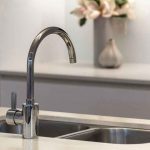Plumbing is a must when building a house. It will supply water to the whole house through its pipes, valves, and hydrants.
Therefore, when you ask: Why would water pressure be low in just one faucet? you may find the answer from this system. This article will provide information about the low hydraulic, how to fix it and how dangerous it is. Keep on reading for details!
What Causes Low Water Pressure In One Shower But Not The Other?
If all the faucets in your home are running with low power, the fault may be from your supplier or your home’s plumbing system. If this is only happening at one, the mistake is coming from itself. Consists of:
- Clogged pipe: sand and dirt can get trapped in the pipe leading to the faucet. It is often the case with the source being a well rather than a municipal one.
- Leaky pipeline: strong impact or prolonged use can cause the pipeline to break or crack. Then, it leads to leakage and reduces its pressure coming out.
- Leaky or locked valve: some families set up a valve for each room. If it is locked, the faucets temporarily stop working. If you only partially lock, the hydraulic will be weak. If the valve is used for a long time, it will become mushy, leading to leakage and slowing down the flow.
- Clogged hydrant: the faucet structure will include rubber bands and discs. Minerals or residues in the liquid will build up deposits on the rubber band and gasket for a long time. Over time, they may become mushy, and the faucet becomes clogged.
How Do You Fix Uneven Water Pressure?
Find The Causes
When determining the cause, you may know how to fix it. Then, follow the following tests to check:
- Hot water supply (if any)
- Faucet having problems and comparing its speed with others
- General, bathroom, and toilet valve to confirm its fully open
- Pipes
Fix The Causes
With a pipe fault, you can easily check an external pipe. However, most errors come from pipes in the wall or deep in the ground. Therefore, you should ask a professional repairer to solve it. They will check with specialized tools to identify the leak before replacing it.
If the cause lies in the partially or fully closed valve, you should follow the “open” symbol on the valve to operate it. If the valve is leaking, you should replace it with a new one.
When the faucet is clogged with minerals or debris, use a vinegar solution and a toothbrush to deal with it. Soak the faucet in vinegar for 10 – 30 seconds, then use a brush to clean it. If it’s a shower with tiny holes, you can use an interdental brush to clean it. In the case the hose is damaged due to the rubber band being stretched, replace it with a new one.
Related: https://www.scratchkitchensalem.com/best-kitchen-faucet-for-low-water-pressure/
Is Low Water Pressure Dangerous?

Yes, in some cases, low hydraulics can be dangerous. The problems are so common that many countries have to enact legislation related to pipes. They use shower valves to help equalize pressure and reduce injuries caused by related problems.
When determining a valve or pipe in your home that is leaking, you need to check the base and wall on both sides. The liquid may seep into the wall, causing peeling in patches. Large pieces can fall to the ground if your ceiling is made of plaster, endangering people below.
It would be best to remember that the force through the hydrant would decrease when there is a leak. However, the smaller the leak, the greater the force, especially in the pipeline. Therefore, it can be dangerous to shoot at someone.
Conclusion
So the question: Why would water pressure be low in just one faucet? got an answer. It can be caused by leaky plumbing, valves or faucets, blocked valves, or deposits in pipes and faucets. When you find the cause, you can repair or replace it yourself. However, in many cases, you may ask for professional assistance.
Low-pressure running water can destroy part of your home and end




